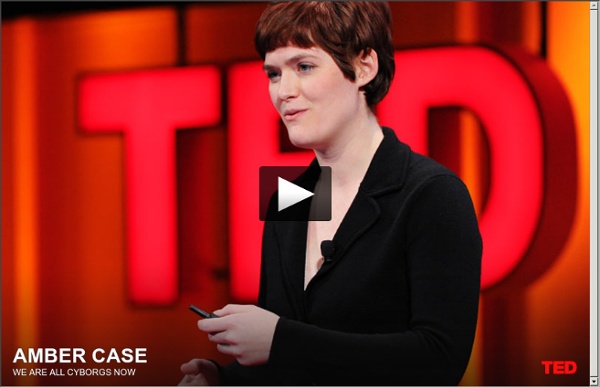



http://www.ted.com/talks/amber_case_we_are_all_cyborgs_now.html
What Business Can Learn from Open Source August 2005 (This essay is derived from a talk at Oscon 2005.) Lately companies have been paying more attention to open source. Ten years ago there seemed a real danger Microsoft would extend its monopoly to servers. It seems safe to say now that open source has prevented that. Sherry Turkle - Interviews and Profiles Sherry Turkle received her Bachelors of Arts summa cum laude in Social Studies from Harvard University and her Ph.D. in Sociology and Personality Psychology from Harvard University. Media appearances in which Sherry Turkle discusses her new book, Alone Together: Why we expect more from technology and less from each other (NY: Basic Books, January 2011), as well as her research in general : The Atlantic Magazine – “Saving the Lost Art of Conversation: In a fast-paced digital age, an MIT psychologist tries to slow us down” (January/February 2014). A profile by Megan Garber. Moyers & Company (PBS) – "Sherry Turkle on Being Alone Together" (October 18, 2013). Sherry tells Bill Moyers: "What concerns me as a developmental psychologist is watching children grow in this new world where being bored is something that never has to be tolerated for a moment."
Engelbart: Augmenting Human Intellect (1962) These hypotheses imply great richness in the new evolutionary spaces opened by progressing from Stage 3 to Stage 4. We would like to study the hypotheses further, examining their possible manifestations in our experience, ways of demonstrating their validity, and possible deductions relative to going to Stage 4. In search of some simple ways to determine what the Neo-Whorfian hypothesis might imply, we could imagine some relatively straightforward means of increasing our external symbol-manipulation capability and try to picture the consequent changes that could evolve in our language and methods of thinking.
no.03: The Telekommunist Manifesto about the publication: In the age of international telecommunications, global migration and the emergence of the information economy, how can class conflict and property be understood? Drawing from political economy and concepts related to intellectual property, The Telekommunist Manifesto is a key contribution to commons-based, collaborative and shared forms of cultural production and economic distribution. Proposing ‘venture communism’ as a new model for workers’ self-organization, Kleiner spins Marx and Engels’ seminal Manifesto of the Communist Party into the age of the internet. As a peer-to-peer model, venture communism allocates capital that is critically needed to accomplish what capitalism cannot: the ongoing proliferation of free culture and free networks. In developing the concept of venture communism, Kleiner provides a critique of copyright regimes, and current liberal views of free software and free culture which seek to trap culture within capitalism.
New Schemas for Mapping Pedagogies and Technologies', Ariadne Issue 56 In this article I want to reflect on the rhetoric of 'Web 2.0' and its potential versus actual impact. I want to suggest that we need to do more than look at how social networking technologies are being used generally as an indicator of their potential impact on education, arguing instead that we need to rethink what are the fundamental characteristics of learning and then see how social networking can be harnessed to maximise these characteristics to best effect. I will further argue that the current complexity of the digital environment requires us to develop 'schema' or approaches to thinking about how we can best harness the benefits these new technologies confer.
Why Schools Need to Get Social, Local and Mobile Troy Williams is Vice President and General Manager of Macmillan New Ventures, the global media company’s division that discovers, develops and markets innovative technologies that make learning more engaging. It’s not revelatory that the academic and the tech worlds move at vastly different paces. Education often lags behind when it comes tech adoption and integration. But there has never been a better time for innovation in the classroom. Although public school systems face drastic budget cuts and harsh public scrutiny, we continue to see the private sector (as well as government initiatives) invest in vibrant and disruptive education tech.
Dangers of social groupthink: A case study in Enterprise 2.0, Social CRM and Social Business For sure, there’s a lot of Goodness in social media—in our personal lives and business. But also a lot of issues to be worked out. That’s why two years ago I established a Social Business category on CustomerThink, and last year launched SocialBusinessOne, a community dedicated to the topic. One of the downsides of social media is that it can accelerate getting locked into a point of view. This is counter intuitive, because you might expect that social media would make it easier to get multiple points of view. It can, but it depends on the group dynamics and the willingness of each of us as individuals to consider alternate ideas. Chicken Little by Frederik Pohl (w/CM Kornbluth) from The Space Merchants How will we feed ourselves as our population grows out of control? After we've cut down every rainforest to graze more cows, where will the fast food burgers of the future come from ? Vats, probably.
The Power of Crowd and Place: A Conversation with Jeff Kirchick from SCVNGR Jeff Kirchick is the Universities and Schools Specialist for SCVNGR, a gaming platform about doing challenges at places. I first met Jeff at the CASE Social Media Conference in San Francisco where he was organizing a “trek” for the conference. It was the most fun I’d had participating in extra-curricular activities at a conference.